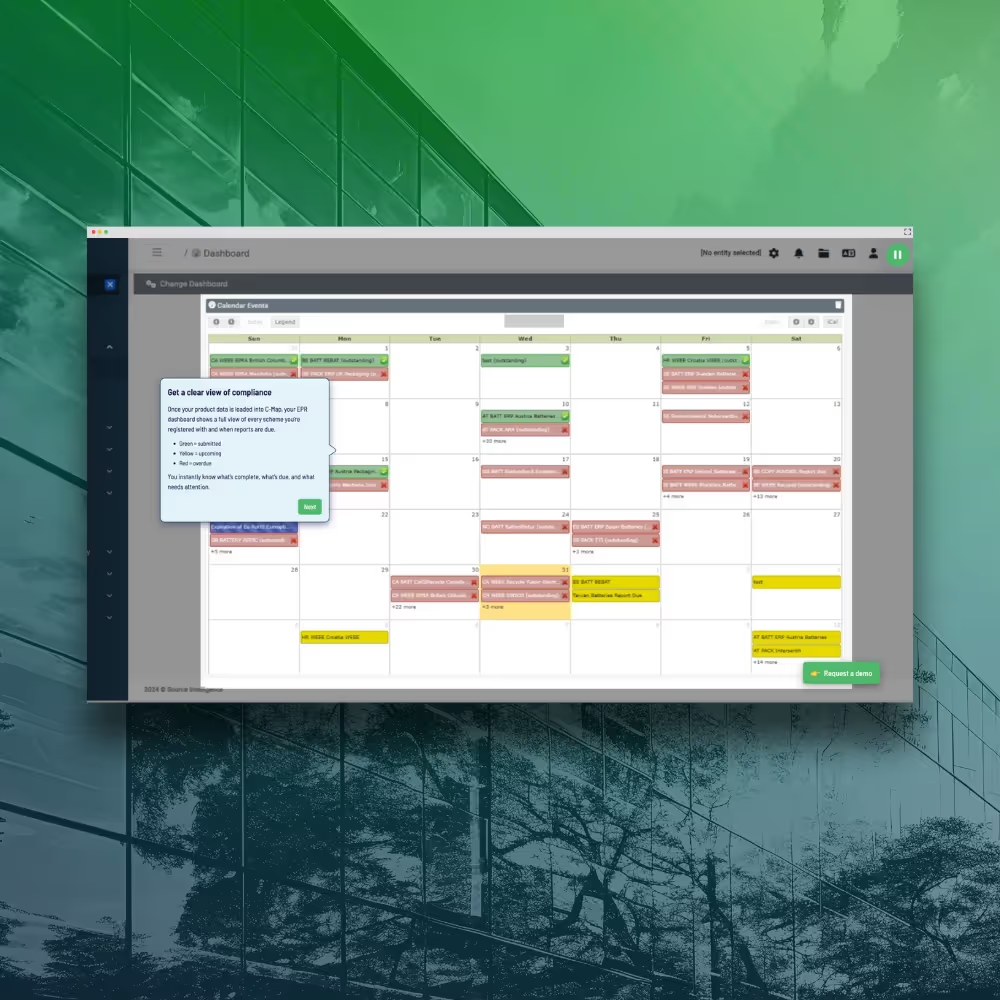
EPR


Simplify Extended Producer Responsibility compliance
Stay ahead of complex EPR regulations with our automated solution. Source Intelligence’s platform streamlines compliance by simplifying data collection, generating accurate reports, and monitoring regulatory changes in real time. Our tools reduce resource burdens and ensure your business stays compliant, empowering you to focus on meeting sustainability goals and minimizing compliance risks.
Core capabilities of our EPR software:
- Comprehensive data integration
- Automated data collation
- Real-time updates on tariff changes and reporting schedules
- Automated evaluation of eco-modulation fees

Simplify Extended Producer Responsibility compliance
Stay ahead of complex EPR regulations with our automated solution. Source Intelligence’s platform streamlines compliance by simplifying data collection, generating accurate reports, and monitoring regulatory changes in real time. Our tools reduce resource burdens and ensure your business stays compliant, empowering you to focus on meeting sustainability goals and minimizing compliance risks.
Core capabilities of our EPR software:
- Comprehensive data integration
- Automated data collation
- Real-time updates on tariff changes and reporting schedules
- Automated evaluation of eco-modulation fees


Navigating EPR regulations and compliance challenges
Extended Producer Responsibility (EPR) is an environmental policy that holds producers accountable for the full lifecycle of their products—from design to disposal. EPR encourages sustainable design by shifting responsibility upstream to producers and providing incentives to reduce environmental impact. Key EPR regulations target packaging, Waste Electrical and Electronic Equipment (WEEE), and batteries due to their high waste volume and toxicity.
EPR compliance is complex due to varying global regulations and evolving requirements. Compliance professionals face challenges preparing reports that meet country-specific standards and tracking frequent legislative updates. These obstacles make it difficult for producers to maintain compliance and increase the risk of penalties or missed reporting obligations.
Navigating EPR regulations and compliance challenges
Extended Producer Responsibility (EPR) is an environmental policy that holds producers accountable for the full lifecycle of their products—from design to disposal. EPR encourages sustainable design by shifting responsibility upstream to producers and providing incentives to reduce environmental impact. Key EPR regulations target packaging, Waste Electrical and Electronic Equipment (WEEE), and batteries due to their high waste volume and toxicity.
EPR compliance is complex due to varying global regulations and evolving requirements. Compliance professionals face challenges preparing reports that meet country-specific standards and tracking frequent legislative updates. These obstacles make it difficult for producers to maintain compliance and increase the risk of penalties or missed reporting obligations.
Risks of non-compliance with EPR laws
Failing to comply with Extended Producer Responsibility laws can expose businesses to significant risks, including:


Achieve EPR compliance seamlessly with Source Intelligence
Source Intelligence simplifies global EPR compliance with an automated platform that streamlines data collation, report building, and submission. Our solution monitors scheme changes—like tariffs and reporting schedules—so you stay up to date effortlessly. We offer flexible support to meet complex EPR obligations. Choose advanced software, expert consultation, or a combination of both to manage electronic waste, packaging, and battery compliance.
How our EPR solution streamlines compliance

Identify risks faster
Automated data collation combines WEEE, packaging, and battery information with SKUs and sales data to create accurate, country-specific reports.

Boost efficiency
Automated workflows reduce resource burdens by streamlining data collation and report generation, minimizing manual tasks, and improving data accuracy.

Mitigate compliance risks
Design assessments reveal end-of-life costs, helping you create products that meet global EPR standards and lower financial risks.

Increase risk foresight
Our solution aligns your business with evolving EPR standards and supports circular economy goals through sustainable product design.
Why choose Source Intelligence?

Educational resources

An Introduction to Extended Producer Responsibility

Complying with the EU Batteries Regulation

Packaging EPR Laws in the U.S.

Software solutions to fit your needs




Simplify EPR reporting and reduce risk with our EPR solution

Events and news
See for yourself




